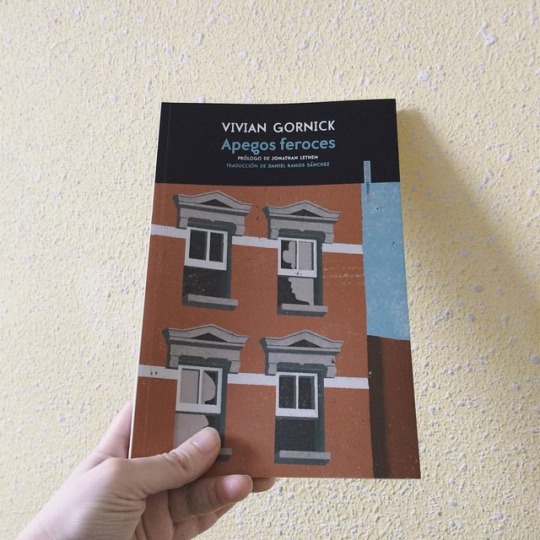#fierceattachments
Photo

“If she would work he wouldn’t have to keep her in the house. She wouldn’t be crazy, and she could tell him to go to hell. Did you ever think about that, my brilliant daughter? That maybe she’s crazy because she can’t tell him to go to hell? When a woman can’t tell a man to go to hell, I have noticed, she is often crazy.” (Fierce Attachments: A Memoir) . . "Si ella trabajara, él no tendría que tenerla en la casa". Ella no estaría loca, y podría decirle que se fuera al infierno. ¿Alguna vez pensaste en eso, mi brillante hija? ¿Que tal vez esté loca porque no puede decirle que se vaya al infierno? Cuando una mujer no puede decirle a un hombre que se vaya al infierno, lo he notado, a menudo está loca ". . . . . . #november #novemberreads #viviangornick #feminism #fierceattachments #paperbacks #books #bookstagram #literatura #libros #yoleoycomparto #yoleoyocomparto #AutumnReads #bookworm #booklove #bookstagram #booklover #bibliophile #bookaholic #addictedtobooks #bookaddict #booknerd #IGreads #webtroverts #womenwriters #currentlyreading (en Cantabria, Spain)
#autumnreads#paperbacks#yoleoycomparto#webtroverts#bookworm#books#feminism#novemberreads#fierceattachments#bookstagram#igreads#booklover#booklove#bookaddict#libros#november#addictedtobooks#literatura#booknerd#bookaholic#womenwriters#viviangornick#bibliophile#yoleoyocomparto#currentlyreading
2 notes
·
View notes
Photo

This is the first of memoirs in my research study of them. Vivian Gornick tells us her story or the story of growing up in NY through the characters she creates of the people she has grown up around. At times it feels as if these characters are fictional even though they are real people who have impacted her and her life. Gornick switches between the present day, walking with her mother through New York City to the past and relationships between people she’s lived with and her lovers.
Gornick’s foundation in her memoir is her tedious relationship with her mother. Then her husband who she married in her twenties and then the intimate relationships she has in her thirties. The descriptions of these relationships is what excites me about this memoir. The characterization of the people in her life that have been essential to who she is as a person, which at the end of the book I have to say is still somewhat unclear.
“I began to grasp the idea of living without a future: we had few moments to waste on bad behavior. I saw errant impulses die before they could make trouble. I saw reflexive anger give way to analytic understanding. I saw petty indulgence stifle itself and a kind of rough emotional justice prevail. All this I saw, and all this I was pleased to see. Then a day came when I also saw that learning to live without a future is a sterile exercise: what looks like life within a walled garden is really life inside a renovated prison yard. Joe’s wife remained an abstraction, but Joe’s marriage became a stunning confinement.”
The book embodies the possibility that humans become who they are because of the series of interactions they have. “Living without a future” is “the way” the book seems to argue or living in the moments of your day to day interactions and relationships. We are free when we live in the moment of those who surround us. We are only confined when we consider how we might be affected in the long term. This thought stayed with me and continues to when I feel stuck in the mundane routine of life.
0 notes
Text
Un ansia de fantasía se activaba tan pronto como me sentaba con la espalda apoyada contra la fachada del apartamento y mis ojos apuntaban hacia la calle. Estas quimeras no estaban muy lejos de los «¿No sería maravilloso si...?» de Nettie, pero suponían un paso importante. Las mías empezaban con «Supongamos que...» y proseguían no con historias de salvación inmediata, sino con fantaseos en un «sentido más amplio». Es decir, las cosas siempre acababan mal, pero en el debacle había grandeza. La moraleja de mis historias era precisamente que la vida es trágica. Estar «en estado de tragedia» equivalía a salvarse de lo que yo asumía que eran los banales pesares de mi propia vida, a los que no encontraba ningún sentido. Salvarme de aquel sinsentido, presumía yo, lo era todo. La amplitud de sentido era la redención.
Apegos feroces, Vivian Gornick
0 notes